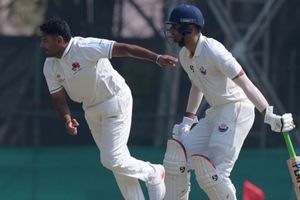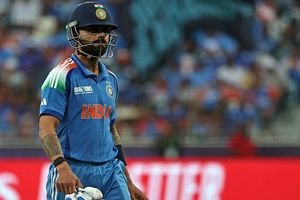England booked their place in the Women's World Cup semifinals after notching up a thrilling four-run win over India in Indore on October 19. Set a challenging target of 289 to win after Heather Knights' brilliant 109, India appeared to be cruising in their chase, positioned strongly at 234/3 with opener Smriti Mandhana anchoring the innings on 88 runs. The match, however, took a decisive turn with Mandhana's soft dismissal in the 42nd over, caught down the ground off spinner Linsey Smith.
England edge India to enter Women's World Cup semifinal
Following this wicket, the co-hosts completely threw away their winning position. As the required run-rate began to climb, the middle order buckled under the pressure. Despite a gritty half-century from Deepti Sharma keeping India's hopes alive, the team ultimately fell short, finishing on 284/6. Linsey Smith held her nerve in the final over, leaving India needing 14 runs that they could not manage. Having suffered three consecutive defeats, India now critically needs to win their last two games to confirm their place in the semifinals.
Heather Knights' ton lifts England despite Deepti Sharma's four-fer
Batting first, England got off to a steady start courtesy of Tammy Beaumont and Amy Jones. Once they found their rhythm, the openers began to pressure the Indian bowlers, forging a 73-run opening partnership that threatened to take control of the match. Jones, in particular, returned to form, reaching her fifty off 62 balls. India showed signs of strain early on, with bowler Renuka Singh even burning a review on an unsuccessful LBW appeal against Beaumont.
The breakthrough eventually came from Deepti Sharma, who stepped up to remove both openers. Beaumont was dismissed for 22, while Jones provided a solid platform with 56 runs off 68 balls. The innings, however, found its backbone when Heather Knight and Nat Sciver-Brunt took charge. They built a 113-run partnership for the third wicket, completely shifting the momentum back to England. Knight, who was returning to the World Cup after losing the captaincy and recovering from a hamstring injury, quickly reached her fifty off 54 balls.
Knight rapidly accelerated after reaching her century off 86 balls, using sweeps and reverse sweeps with exceptional precision against India’s spin trio of Sree Charani, Deepti Sharma, and Sneh Rana. India, unfortunately, wasted their second review of the match—and their eighth of the tournament, the most by any team—on an LBW appeal by Deepti against Sciver-Brunt. Sciver-Brunt played a crucial supporting role, contributing 38 off 49 balls. After Knight was run out for a superb 109, England lost a little momentum, having previously looked set to cross the 300-run mark. However, Charlie Dean provided a late boost with a quickfire 19 off 13 balls to inject fresh impetus into the innings.
Deepti Sharma was arguably India’s standout performer, finishing with exceptional figures of 4 wickets for 51 runs from her ten overs, matching the four wickets taken by Sree Charani. On the other hand, Amanjot Kaur, used as a sixth bowling option, couldn't secure a breakthrough, and the new-ball pair of Renuka Singh and Kranti Goud couldn't get a single wicket.
Mandhana-Harmanpreet-Deepti's fifties couldn't save India
Pratika Rawal's early dismissal gave India a jittery start, edging a delivery to Lauren Bell. Harleen Deol then looked fluent, scoring 24 off 31 balls with five fours, but her innings was cut short when Charlie Dean trapped her plumb in front of the wicket. At this stage, with one wicket down and the required run rate hovering around 6.50, it seemed as though India might struggle to maintain the pace.
However, the vice-captain and captain, Smriti Mandhana and Harmanpreet Kaur, had other ideas. The pair combined to wrest the momentum back for India, building an essential 125-run stand for the third wicket. Harmanpreet took the aggressive route, attacking the England bowlers, including key spinner Sophie Ecclestone. Mandhana, by contrast, took a more measured approach, waiting 14 overs before hitting her first boundary. Once settled, however, Mandhana became extremely difficult to dislodge.
Both batters reached their fifties quickly, with Mandhana scoring hers off 60 balls and Harmanpreet following soon after off 54. The partnership was eventually broken when Nat Sciver-Brunt dismissed Harmanpreet for 70 as she attempted to steer the ball through the third man region. Deepti Sharma then joined Mandhana, and the two added another 67 crucial runs.
The momentum shifted decisively once again when Mandhana departed for a masterful 88, attempting to clear the boundary off Linsey Smith. Despite Mandhana’s efforts to bring India close, the chase began to unravel. Although Deepti continued her solid innings, reaching her fifty off 55 balls, the middle order faltered. Richa Ghosh fell to Sciver-Brunt, and Deepti was later dismissed by Ecclestone. The absence of an extra batter was keenly felt in the death overs. With 14 runs needed from the final over, Linsey Smith held her nerve, successfully defending the target.
India will next face New Zealand on October 23 in a do-or-die clash.
ADVERTISEMENT










